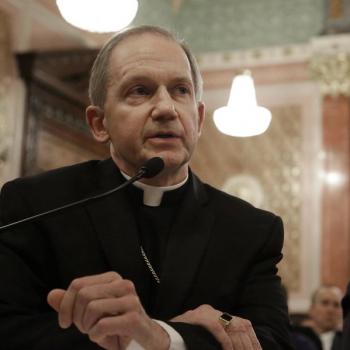Quoting G.K. Chesterton is always dangerous, but especially if you quote him to serve a preconceived or ideological conclusion. Rather than running the risk of thinking, you run the risk of misrepresenting Chesterton with quotations taken out of context. This, I fear, is what my friend, American Chesterton Society president Dale Ahlquist, has done in an article in Catholic World Report, on the Alfie Evans case in England.
Alfie, born in May, 2016, in Liverpool, was at six months found to have a neurodegenerative disorder. He was admitted to Alder Hey Children’s Hospital in Liverpool in December 2016, where he was put on life support, including a ventilator. His condition did not improve and at the end of 2017, doctors decided to remove life support. His parents objected, but after a lengthy legal battle, life support was removed April 23, 2018. Alfie died five days later.
Mr. Ahlquist’s article, headlined “Murdered by a Machine,” accuses Alder Hey of “systematically preventing parents from taking their own child to another hospital to try to save his life.” Mr. Ahlquist also accuses the English government of Chesterton’s “own native England (of) stepping in and siding with the hospital against the parents.” What the hospitals and the British courts did to Alfie, he writes, “was no more than a death sentence.”
Let us pause upon this. Mr. Ahlquist, with no evidence, accuses world-class medical professionals and the English courts of working together to murder a small child.
On a certain level, I as a fellow Chestertonian understand where Mr. Ahlquist is coming from. His entire life, Chesterton denounced the excesses of Big Government and Big Business. But he never denounced government as government, or business as business. He owned a business, his newspaper. If, in the 15 million to 16 million words he wrote during his lifetime he accused business or government of outright murder, I am not aware of it.
This article is entirely lacking in Chesterton’s balance. It’s one of those articles that is hard to rebut because almost every sentence wants a rebuttal. Where does one start? Let’s start at the beginning.
First sentence: “Even the hardened cynic would be shocked at the hospital that insists on a patient dying rather than releasing him to be treated at a different hospital.”
“Insists”? Nobody insisted that Alfie Evans die. In fact, it was out of doctors’ hands. Alfie’s neurodegenerative disorder was fatal and rapidly progressive. He lost vegetative functions that are extremely primitive, including the ability to breathe and protect his airway and lungs from aspiration due to a lack of very simple reflexes. There is no treatment for this, no coming back from it.
All the expert witnesses, including those brought by the family from Bambino Gesù Hospital in Rome, agreed on his type of medical problem, despite being not clear as to the exact genetic nature of the disease. Whatever medical professionals may have disagreed on, such as whether Alfie should be transported to Italy for treatment, on this they were unanimous: Alfie’s condition was progressive, irreversible, and already profoundly damaging. He was not disabled, as some have distorted his condition to represent. His brain was dying. Alfie Evans was dying.
Next sentence: “Even a cynic would be a little put off by a hospital that would not even diagnose a patient but conclude that death would be in his best interests.”
Alfie’s condition was officially called an “undiagnosed neurodegenerative disorder.” People latched onto the word “undiagnosed” as if it meant that doctors never properly examined Alfie, but arbitrarily decided he was a hopeless case and should die. But in this context, “undiagnosed” means that the exact genetic cause was unexplained according to the standard that demands a clear genetic cause for his pattern of pathology. Sadly, Alfie Evans’ symptoms and disease progression are well known, fall into a category of diseases likely to be “mitochondrial cytopathies,” and are tragically known in every children’s hospital in Western Europe and America.
For a condition as complex as a neurodegenerative disorder, this is to be expected. What is not contested, however, by anyone, is again, the prognosis: Alfie’s case was terminal, there was no known cure. Even the doctors at Bambino Gesù Hospital, who offered to treat Alfie, agreed about this. Indeed, by the end of Alfie’s life – and I apologize in advance for being crude – his brain was mush. Death was inevitable.
But Mr. Ahlquist, echoing American pro-lifers who rallied around Alfie’s cause, pushes the falsehood that Alfie was murdered. Some even went so far as to say that Alfie was starved to death (Mr. Ahlquist, to his great credit, avoids this lie), even though he did have a feeding tube inserted. True, water and nutrition were temporarily withheld once Alfie was removed from his ventilator, but that’s standard procedure while doctors wait for the patient to stabilize. Also, with a terminally ill patient’s body unable to digest food, a full belly will do more harm than good – and may hasten death.
Ok, Alfie was dying. But why remove life support? Does that not constitute murder, to hasten death this way? Should we not try to preserve life, especially innocent life, at all costs? No. And this isn’t me speaking. This is the Catholic Church. This can be found in a lot of places. I’ll use what St. John Paul II wrote in his encyclical Evangelium Vitae:
Euthanasia must be distinguished from the decision to forego so-called “aggressive medical treatment.” in other words, medical procedures which no longer correspond to the real situation of the patient, either because they are by now disproportionate to any expected results or because they impose an excessive burden on the patient and his family. In such situations, when death is clearly imminent and inevitable, one can in conscience “refuse forms of treatment that would only secure a precarious and burdensome prolongation of life, so long as the normal care due to the sick person in similar cases is not interrupted.” Certainly, there is a moral obligation to care for oneself and to allow oneself to be cared for, but this duty must take account of concrete circumstances. It needs to be determined whether the means of treatment available are objectively proportionate to the prospects for improvement. To forego extraordinary or disproportionate means is not the equivalent of suicide or euthanasia; it rather expresses acceptance of the human condition in the face of death.
This is what the medical professionals meant when they said that removing Alfie from life support was in his best interests: the treatment was “disproportionate to any expected results” and constituted “an excessive burden on the patient and his family.” Alfie’s death was “clearly imminent and inevitable” and ceasing treatment beyond palliative care was clearly within the bounds of both medical and Christian ethics.
Next: Dale Ahlquist, G.K. Chesterton, and socialized medicine
Technical assistance for this article was provided by Dan Conway, M.D.











